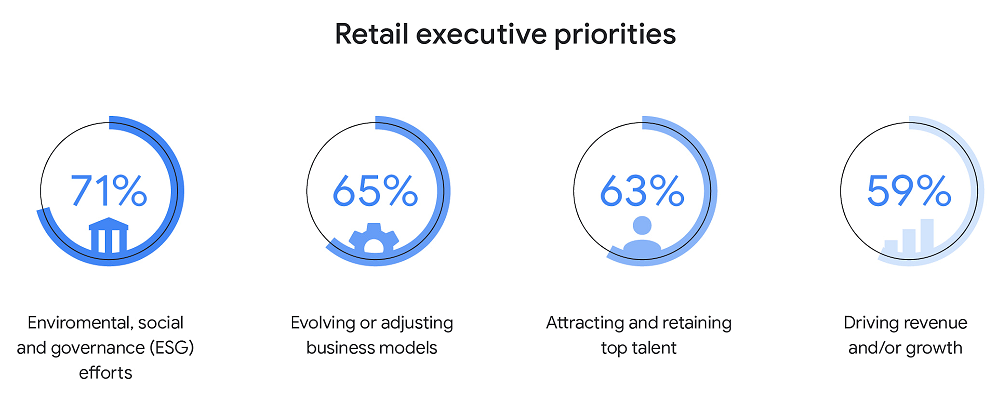Retail is a fast-paced, hyper-competitive industry with retailers battling tight margins, supply chain issues, rising prices and fast changing consumer demand. And if that wasn’t enough, they feel the urgency to be more sustainable, and vocal about the good they are doing.
Therefore, we at Google Cloud are sharing insights on how more than 500 retail executives polled in a recent survey, conducted by The Harris Poll, of 1,491 industry executives across 16 countries are thinking about sustainability.
A rising priority
Most of us have near daily interaction with retail. That higher level of visibility also means that the environmental footprint of retail is often under the microscope, from the sustainability of fashion and product packaging, to the complexity of resource-intensive supply chains.
A remarkable 71% of retail leaders surveyed indicated that they were prioritizing sustainability, compared to 64% of the global average of leaders across all industries - the highest score across all industries. But perhaps most interesting of all is how highly sustainability ranks among other priorities for retailers - it’s seen as more important than driving revenue, attracting talent and evolving business models - all in one of the most highly competitive, low-margin sectors of the economy.

Efforts falling short
Across all industry executives surveyed, retailers gave themselves the most sobering assessment of their own sustainability initiatives. For example, only 36% of retail executives confirm that they run a recycling program (compared to the global industry average of 42%). And despite the high priority retailers are now placing on sustainable practices, the retail executives surveyed indicate that they are the least likely to use technology to make their business practices more sustainable - from developing more eco-friendly products and measuring the impact of their sustainability efforts, to using digital technologies to transform their business operations.
“Visibility into supply chains and logistics was probably the greatest challenge during the holiday season. Winning companies are taking steps to address this, by looking beyond traditional data sources for greater visibility and control.”
Where to start?
Although retailers are struggling to utilize tech in their sustainability efforts, 93% of retail executives believe that technology can make it possible for their organization to be more sustainable. But the truth is that more than half of them (54%) simply don’t know where to start with regards to sustainability - considerably lower than the global average (65%). It is imperative that technology providers, including Manhattan Associates and Google Cloud, show this critical sector how technology can tangibly and efficiently make a positive impact in their sustainability efforts without requiring a retailer to overhaul their operations. For retailers looking to accelerate their journey, here are a few tips on how technology can help move the needle on sustainability and their day-today business at the same time:
- Tip: reduce waste
Use a combination of data analytics and flexible omnichannel commerce solutions to reduce waste through efficient inventory management and better demand forecasting: Expending resources on moving goods inefficiently isn’t just bad business, it’s bad for the environment. It is important for retailers to have the visibility to know they are getting the right products to the right places at the right time with the flexibility to adjust due to unforeseen circumstances. An excellent example is PVH’s response to the global pandemic. With iconic brands as Calvin Klein and TOMMY HILFIGER, , PVH was forced to temporarily close its physical stores and, as a result, experienced a sudden increase in online sales. The retailer was able to quickly pivot by adjusting its business rules in Manhattan Distributed Order Management (part of Manhattan Active® Omni) to expose store inventory to online consumers and reroute its fulfillment processes. In a matter of days, PVH was able to leverage both its distribution centers and vast store network to fulfill its online orders.

- Tip: run on cleanest cloud
Look to the cleanest supply chain and omnichannel commerce solution, run on the cleanest cloud: Running operations in the cloud allows retailers to be more agile and makes it easier to meet the changing customer demands. However, not all clouds are equal - Google Cloud is the cleanest cloud in the industry and is carbon neutral in its operations, with a goal to run 24/7 on carbon-free energy at all of our data centers by 2030. We’ve also built a collection of tools that can help retailers accurately track their gross carbon emissions associated with their Google Cloud usage and take action to reduce their environmental footprint. That’s why Manhattan Associates and Google Cloud have partnered to run Manhattan Active® Supply Chain, a comprehensive cloud-native solution, on Google Cloud.
- Tip: cut down emissions
Cut down on emissions by maximizing delivery fleet efficiency: Delivery fleets can consume immense amounts of fuel, adding to a retailer’s environmental footprint. By leveraging smart analytics, retailers can greatly reduce this impact while still meeting rising consumer demands for fast shipping. For example, Google Cloud’s Last Mile Fleet & Cloud Fleet Routing solution gives retailers an integrated suite of mapping, routing, and analytics capabilities that can help them and carriers not only meet consumer expectations, but also achieve sustainability targets by reducing the number of miles traveled and the number of carbon-emitting vehicles on the road.

 Tim Michalak, Retail/CPG Strategic ISV Lead, Google Cloud
Tim Michalak, Retail/CPG Strategic ISV Lead, Google Cloud

Reacties 0